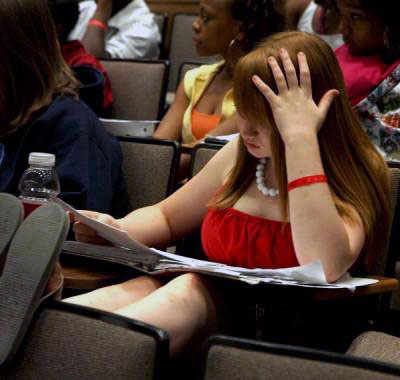All Nonfiction
- Bullying
- Books
- Academic
- Author Interviews
- Celebrity interviews
- College Articles
- College Essays
- Educator of the Year
- Heroes
- Interviews
- Memoir
- Personal Experience
- Sports
- Travel & Culture
All Opinions
- Bullying
- Current Events / Politics
- Discrimination
- Drugs / Alcohol / Smoking
- Entertainment / Celebrities
- Environment
- Love / Relationships
- Movies / Music / TV
- Pop Culture / Trends
- School / College
- Social Issues / Civics
- Spirituality / Religion
- Sports / Hobbies
All Hot Topics
- Bullying
- Community Service
- Environment
- Health
- Letters to the Editor
- Pride & Prejudice
- What Matters
- Back
Summer Guide
- Program Links
- Program Reviews
- Back
College Guide
- College Links
- College Reviews
- College Essays
- College Articles
- Back
Dyslexia: Education in Reverse
Dyslexia is a learning disorder involving reading difficulty caused by speech sounds and learning how they relate to letters and words. Also called specific reading disability, dyslexia is a common learning disability in children. 70 to 85 percent of kids with some type of learning disability have dyslexia. There are eight causes for having a reading difficulty; Optilexia, Visual processing weakness, Contrast sensitivity, Poor short-term Memory, Fluency block, Attention deficit, Stress spirals and Auditory processing weakness. All these causes of dyslexia cause some students and children to be held back for another year so they can learn in a different environment that is easier for them.
Dyslexia was first recognized in 1884 by German ophthalmologist, R. Berlin. In the word dyslexia, dys means ill and difficult and lexis means word. It is often referred to as just learning or reading disability. One of the most common mistakes of students with this disability is not being able to recognize a word. This is known as Optilexia. It causes children to throw fits, have melt downs and complain which is another symptom of dyslexia, Contrast Sensitivity.
Dyslexia has been around for many generations. It is seen in several young children and some adults. When diagnosed with dyslexia, there will usually be a parent and teacher meeting to discuss the procedure they need to take for the child. A parent of a first-grade student at Brookland admitted, “My child was diagnosed with dyslexia when he started 1st grade. I had a meeting with his teacher to discuss what we needed to do.” Often children with Dyslexia will be held back an extra year so they can be put in a different learning environment. In this 1st graders case, this happened. “After the meeting we had another one at the end of the year. The teacher, resource teacher, counselor, special education teacher and I decided to hold him back another year and put him in first grade for a second time.”
Most kids who have dyslexia get a label. They can be referred to as dumb, “not trying hard enough” or lazy. A Greene County Tech student says, “When I moved to Tech after being at Brookland, I was treated very well. At my old school my teacher labeled me and she left me behind just because I couldn’t read my book. She said the only way she was going to help me was if I kept trying. She never even helped me after I kept trying harder.” After talking to his mother she stated, “The move of my son to Tech was a fantastic idea. He is getting so much better. The teachers love him and he loves the teachers.”
Dyslexia can be education in reverse for some children. Dyslexics are very smart people. Having a disability of any kind does not make you a dumb person. In fact, some of the most famous people in the world are dyslexic. Albert Einstein was one of the most influential individuals to have had dyslexia. He had trouble with mathematical equations because he could not remember the numbers after looking at them for long periods of time. Erin Brockovich, a famous American legal clerk and the president of Brockovich Research and Consulting Firm, has had dyslexia since her teenage years. Jim Carrey also had dyslexia and is known worldwide. So now you can see just because you switch your b’s and d’s and does not mean you are dumb and unintelligent. Family members who have relatives who are dyslexic get to see a whole new world when it comes to learning. Dyslexics also have big imaginations. Often, they like to paint or color what they are feeling. This is true with the 1st grader mentioned above. “I love to play but coloring is really fun. I have lots of coloring pages on my fridge. Mom gets mad sometimes because the fridge is so colorful,” says the student. Don’t get mad because you have dyslexia or any other kind of disability that causes you to be “slower” than other kids in your grade. It just means you are taking longer than others to grasp an idea and that’s acceptable. Dyslexics are capable and worthy just as everyone else.

Similar Articles
JOIN THE DISCUSSION
This article has 0 comments.

Don't be mad because you are dyslexic. You are just taking longer to ripen.